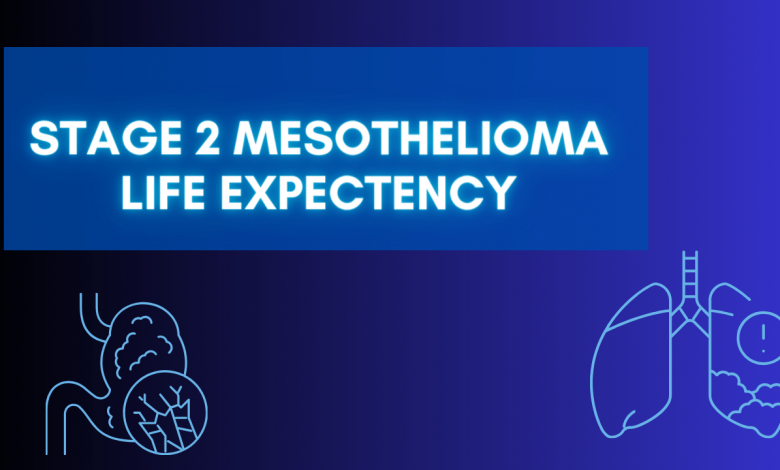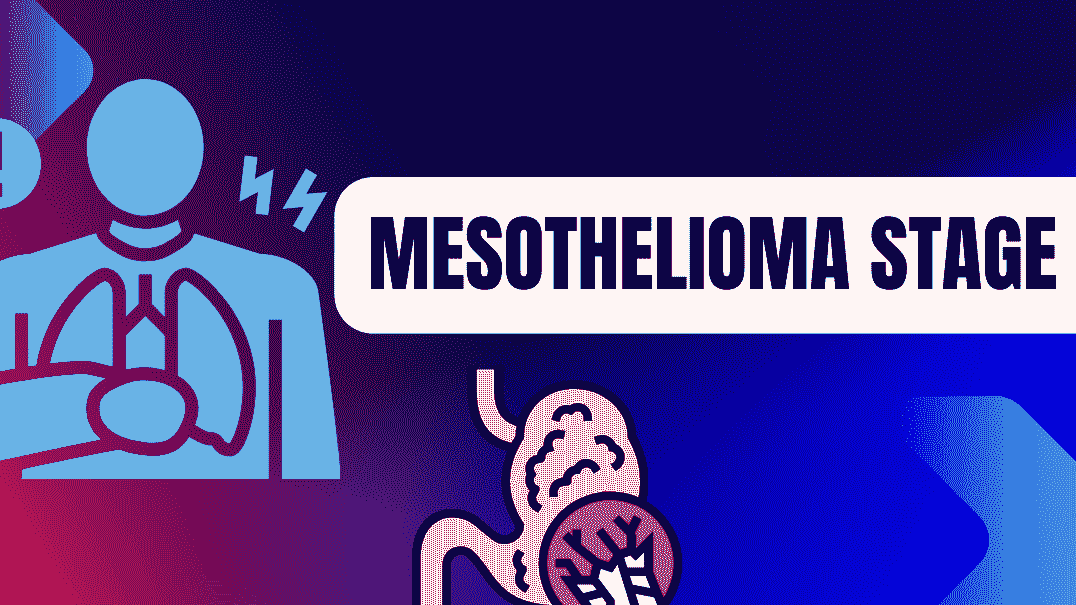Stage 2 Mesothelioma Life Expectancy – Latest 2024

Mesothelioma is a rare and aggressive form of cancer primarily caused by exposure to asbestos fibers. Like all cancers, the stage at which mesothelioma is diagnosed plays a critical role in determining life expectancy and treatment options. In this article, we’ll delve into stage 2 mesothelioma life expectancy, the factors that influence it, and what patients can expect.
Table of Contents
What Is Stage 2 Mesothelioma?
Stage 2 mesothelioma is the second of four stages used to classify the extent and progression of the disease. At this stage, the cancer is still localized but may have spread to nearby lymph nodes or structures. Early detection at this stage is crucial for improving prognosis and treatment options. See Also Mesothelioma Stage 1: Early Diagnosis and Prognosis – Latest 2023
Factors Influencing Life Expectancy at Stage 2
- Tumor Size: The size of the tumor(s) in stage 2 mesothelioma can vary. Smaller tumors are generally associated with a better prognosis.
- Location: The location of the tumor within the body matters. Some areas are more accessible for surgical intervention, while others pose greater challenges.
- Cell Type: Mesothelioma has several cell types, with epithelioid being the most responsive to treatment and having a better prognosis than sarcomatoid or biphasic types.
- Overall Health: The patient’s overall health and ability to withstand treatments like surgery, chemotherapy, and radiation therapy play a significant role in life expectancy.
- Age: Younger patients often have a better prognosis than older ones, as they may better tolerate aggressive treatments.
Life Expectancy and Treatment Options
Life expectancy at stage 2 mesothelioma varies but is generally more favorable than at later stages. With appropriate treatment, which often includes surgery, chemotherapy, and/or radiation therapy, some patients have achieved significant extensions in life expectancy and improved quality of life.
Survival Rates at Stage 2 Mesothelioma
It’s important to note that survival rates are estimates based on previous cases and can’t predict individual outcomes. However, the five-year survival rate for stage 2 mesothelioma is around 30% to 40%, meaning that a significant portion of patients can achieve long-term survival with aggressive treatment.
Quality of Life Considerations
Beyond life expectancy, mesothelioma patients and their families should consider the patient’s quality of life. Palliative care, pain management, and psychological support can greatly enhance the patient’s well-being, regardless of their prognosis.
Receiving a stage 2 mesothelioma diagnosis can be overwhelming, but it’s essential to remember that advancements in mesothelioma treatment continue to improve outcomes. Early detection, a comprehensive treatment plan, and a supportive healthcare team can make a significant difference in life expectancy and overall quality of life for mesothelioma patients.
If you or a loved one is facing a mesothelioma diagnosis, consult with a mesothelioma specialist to explore the most suitable treatment options and develop a personalized care plan.

Treatment Modalities at Stage 2 Mesothelioma
- Surgery: Surgical options for stage 2 mesothelioma may include extrapleural pneumonectomy (EPP) or pleurectomy/decortication (P/D). EPP involves the removal of the affected lung, the lining around the heart (pericardium), and parts of the diaphragm. P/D, on the other hand, focuses on removing the pleural lining and any visible tumors while sparing the lung. The choice of surgery depends on the patient’s overall health and tumor size and location.
- Chemotherapy: Chemotherapy is often used as an adjunct to surgery or as a primary treatment for patients who may not be suitable candidates for surgery. This treatment aims to shrink tumors and prevent further spread.
- Radiation Therapy: Radiation therapy may be employed to target and kill cancer cells in the chest area. It is often used alongside surgery or chemotherapy to enhance treatment effectiveness.
- Immunotherapy: Immunotherapy is an emerging treatment option for mesothelioma. Clinical trials are ongoing to determine its efficacy for mesothelioma patients.
- Clinical Trials: Mesothelioma patients at stage 2 may also be eligible to participate in clinical trials evaluating experimental treatments. These trials can offer access to cutting-edge therapies that may provide more favorable outcomes.
Monitoring and Follow-Up
Patients with stage 2 mesothelioma require close monitoring and regular follow-up appointments with their healthcare team. These appointments allow healthcare providers to track the progression of the disease and make adjustments to the treatment plan as needed.
Coping Strategies and Support
It’s essential for patients and their families to seek emotional support through counseling, support groups, or therapy. Palliative care specialists can help manage symptoms and improve the patient’s overall quality of life.
Legal Considerations
In cases where asbestos exposure was due to occupational or environmental factors, patients may consider legal actions to seek compensation for medical expenses and other damages. Consulting an attorney experienced in asbestos-related cases can provide guidance in this regard.
While stage 2 mesothelioma is a serious diagnosis, advancements in treatment and a multidisciplinary approach offer hope for improved life expectancy and quality of life. Patients and their families should actively participate in their treatment decisions, seek emotional support, and explore available resources to navigate this challenging journey.
If you or someone you know is facing a mesothelioma diagnosis, it’s crucial to consult with a specialized healthcare team to discuss treatment options and develop a comprehensive care plan tailored to the individual’s needs and circumstances. Early intervention and a proactive approach can make a significant difference in outcomes.
Prognostic Factors for Stage 2 Mesothelioma
- Tumor Characteristics: The size, location, and extent of the tumor play a significant role in prognosis. Smaller tumors that are confined to one side of the chest generally have a better outlook than larger or more invasive ones.
- Cell Type: The histological type of mesothelioma cells can impact prognosis. Epithelioid mesothelioma tends to respond more favorably to treatment and has a better prognosis compared to sarcomatoid or biphasic mesothelioma, which are typically more aggressive.
- Lymph Node Involvement: The spread of cancer to nearby lymph nodes can worsen the prognosis. In stage 2, lymph nodes are usually not affected, which is a positive indicator.
- Patient’s Overall Health: The general health and fitness of the patient can influence how well they tolerate treatments and recover. Those with better overall health often have improved life expectancy.
Survival Rates for Stage 2 Mesothelioma
Survival rates for stage 2 mesothelioma can vary, but on average, patients may have a median survival time of around 20 to 30 months. However, it’s essential to remember that these are statistical averages, and individual outcomes can differ significantly based on various factors, including those mentioned above.
Improving Life Expectancy
Several strategies can contribute to improving life expectancy for stage 2 mesothelioma patients:
- Early Diagnosis: Detecting mesothelioma at an earlier stage, such as stage 2, provides more treatment options and better chances of successful intervention.
- Multimodal Treatment: A combination of treatments, such as surgery followed by chemotherapy or radiation therapy, can enhance outcomes.
- Clinical Trials: Participation in clinical trials can provide access to innovative therapies and potentially improve prognosis.
- Palliative Care: Integrating palliative care into the treatment plan can improve the patient’s quality of life and symptom management.
Emotional Support
A mesothelioma diagnosis can be emotionally challenging. Patients and their families should consider seeking support from therapists, counselors, or support groups specializing in cancer care. Emotional well-being can positively impact treatment outcomes.
Lifestyle Choices
Patients can also make lifestyle choices to support their overall health during treatment. This includes maintaining a balanced diet, staying physically active as advised by healthcare professionals, managing stress, and getting adequate rest.
Continued Research
Ongoing research into mesothelioma treatments and advancements in medical science offer hope for improved life expectancy in the future. Patients and their families can stay informed about the latest developments in mesothelioma care.
While a stage 2 mesothelioma diagnosis is serious, early detection and advances in treatment options provide reasons for hope. It’s crucial for patients and their loved ones to work closely with healthcare providers to develop a personalized treatment plan and consider all available resources to improve prognosis and quality of life.
Subscribe to the channel to Explore Biological Sciences



